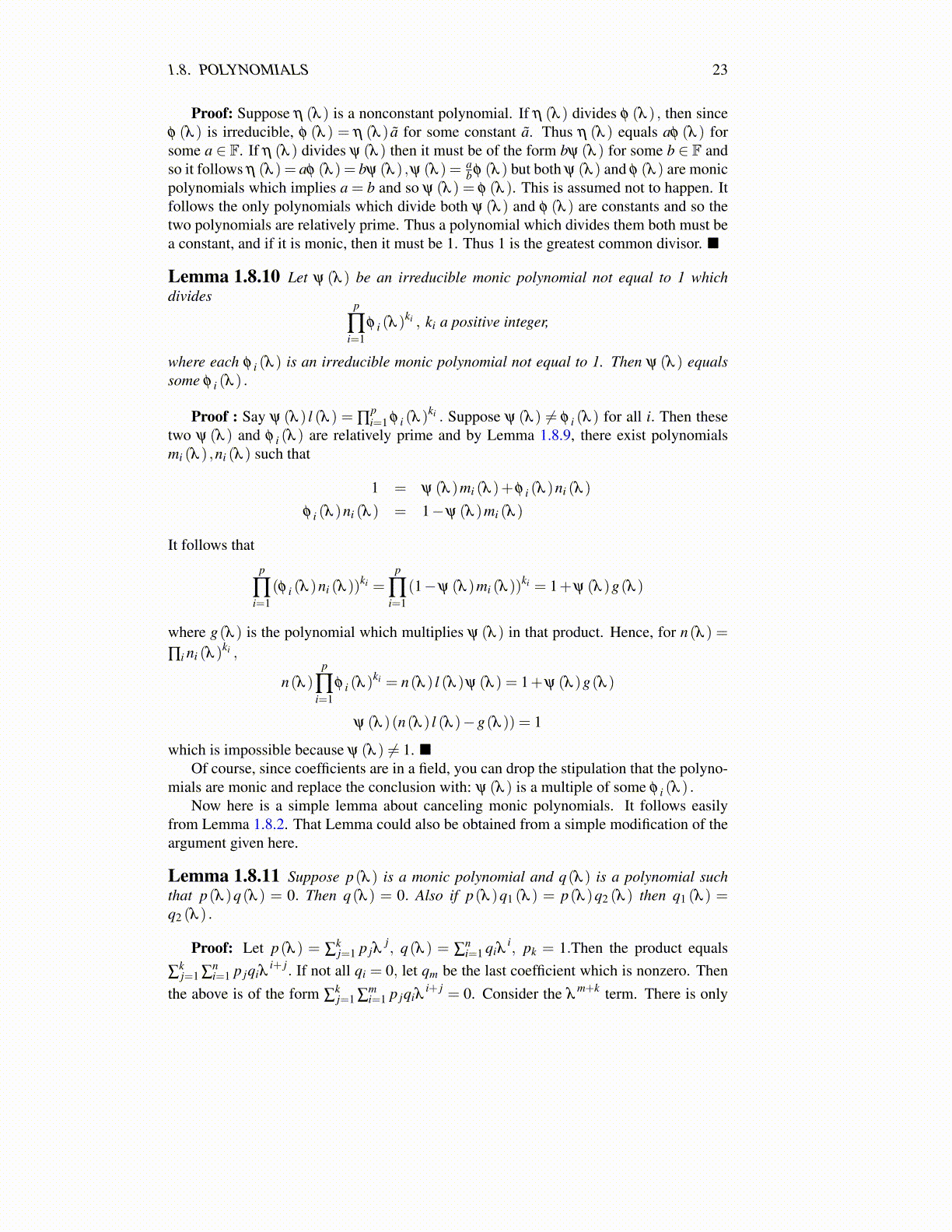
1.8. POLYNOMIALS 23
Proof: Suppose η (λ ) is a nonconstant polynomial. If η (λ ) divides φ (λ ) , then sinceφ (λ ) is irreducible, φ (λ ) = η (λ ) ã for some constant ã. Thus η (λ ) equals aφ (λ ) forsome a ∈ F. If η (λ ) divides ψ (λ ) then it must be of the form bψ (λ ) for some b ∈ F andso it follows η (λ ) = aφ (λ ) = bψ (λ ) ,ψ (λ ) = a
b φ (λ ) but both ψ (λ ) and φ (λ ) are monicpolynomials which implies a = b and so ψ (λ ) = φ (λ ). This is assumed not to happen. Itfollows the only polynomials which divide both ψ (λ ) and φ (λ ) are constants and so thetwo polynomials are relatively prime. Thus a polynomial which divides them both must bea constant, and if it is monic, then it must be 1. Thus 1 is the greatest common divisor. ■
Lemma 1.8.10 Let ψ (λ ) be an irreducible monic polynomial not equal to 1 whichdivides
p
∏i=1
φ i (λ )ki , ki a positive integer,
where each φ i (λ ) is an irreducible monic polynomial not equal to 1. Then ψ (λ ) equalssome φ i (λ ) .
Proof : Say ψ (λ ) l (λ ) = ∏pi=1 φ i (λ )
ki . Suppose ψ (λ ) ̸= φ i (λ ) for all i. Then thesetwo ψ (λ ) and φ i (λ ) are relatively prime and by Lemma 1.8.9, there exist polynomialsmi (λ ) ,ni (λ ) such that
1 = ψ (λ )mi (λ )+φ i (λ )ni (λ )
φ i (λ )ni (λ ) = 1−ψ (λ )mi (λ )
It follows that
p
∏i=1
(φ i (λ )ni (λ ))ki =
p
∏i=1
(1−ψ (λ )mi (λ ))ki = 1+ψ (λ )g(λ )
where g(λ ) is the polynomial which multiplies ψ (λ ) in that product. Hence, for n(λ ) =∏i ni (λ )
ki ,
n(λ )p
∏i=1
φ i (λ )ki = n(λ ) l (λ )ψ (λ ) = 1+ψ (λ )g(λ )
ψ (λ )(n(λ ) l (λ )−g(λ )) = 1
which is impossible because ψ (λ ) ̸= 1. ■Of course, since coefficients are in a field, you can drop the stipulation that the polyno-
mials are monic and replace the conclusion with: ψ (λ ) is a multiple of some φ i (λ ) .Now here is a simple lemma about canceling monic polynomials. It follows easily
from Lemma 1.8.2. That Lemma could also be obtained from a simple modification of theargument given here.
Lemma 1.8.11 Suppose p(λ ) is a monic polynomial and q(λ ) is a polynomial suchthat p(λ )q(λ ) = 0. Then q(λ ) = 0. Also if p(λ )q1 (λ ) = p(λ )q2 (λ ) then q1 (λ ) =q2 (λ ) .
Proof: Let p(λ ) = ∑kj=1 p jλ
j, q(λ ) = ∑ni=1 qiλ
i, pk = 1.Then the product equals
∑kj=1 ∑
ni=1 p jqiλ
i+ j. If not all qi = 0, let qm be the last coefficient which is nonzero. Thenthe above is of the form ∑
kj=1 ∑
mi=1 p jqiλ
i+ j = 0. Consider the λm+k term. There is only